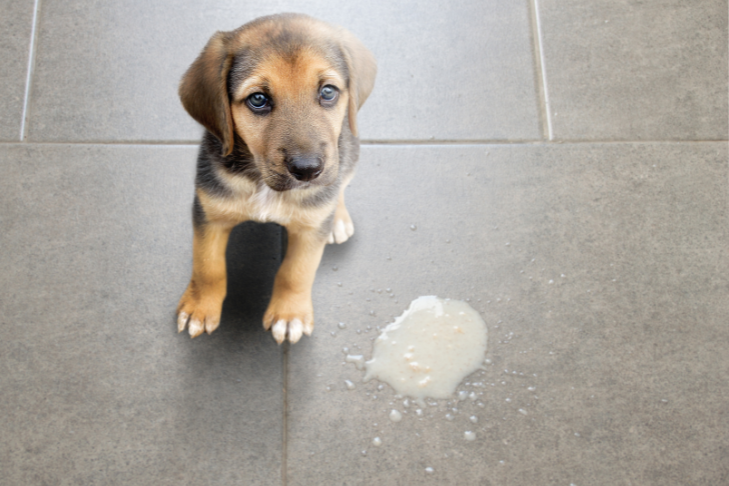Why Is My Dog Vomiting?

Seeing your dog vomit can be worrying, especially when you’re not sure what caused it. Occasional vomiting is relatively common in dogs and can happen for a variety of everyday reasons, from eating too fast to trying a new treat or snack that doesn’t sit well. While it’s never pleasant to watch, understanding why it happens can help you better support your pup’s comfort and overall digestive health.
Here are some of the most common causes of occasional vomiting, what signs to keep an eye on, and how you can help keep your dog’s gut in balance.
1. Eating Too Quickly
Some dogs inhale their food faster than they can swallow it. This can lead to regurgitation shortly after eating, especially if they’ve gulped down large pieces of kibble or too much water at once. Using a slow-feed bowl, breaking meals into smaller portions, or hand-feeding can help pace your dog’s eating and reduce the chance of stomach upset.
2. Dietary Changes or New Treats
Sudden changes to your dog’s diet, like switching food brands or introducing new treats, can sometimes cause digestive sensitivity. If you’re trying a new food, make the transition gradually over 7–10 days by mixing small amounts of the new food into the old one. This gives your dog’s digestive system time to adjust without discomfort.
3. Eating Something They Shouldn’t
Dogs are naturally curious and may nibble on grass, sticks, table scraps, or other items they find outside. In many cases, this can irritate their stomach and cause temporary vomiting. Keeping an eye on what your dog eats during walks and storing non-pet foods or household items out of reach can help minimize this risk.
4. Sensitivity to Certain Ingredients
Some dogs may have sensitivities to specific ingredients, such as dairy, wheat, or fatty foods. If your dog’s stomach seems unsettled after certain meals, it may help to simplify their diet with clean, recognizable ingredients or a limited-ingredient formula. Always talk to your veterinarian before making significant dietary changes or if your dog’s vomiting becomes frequent.
5. Stress and Environmental Factors
Just like people, dogs can experience occasional stress-related stomach upset. Changes in routine, loud noises, travel, or separation can all affect your dog’s digestive balance. Maintaining a consistent routine, providing calming support and enrichment activities, and keeping mealtimes stress-free can all support normal digestion.
When to Contact Your Veterinarian
While occasional vomiting can be normal, persistent or severe vomiting should always be evaluated by a veterinarian, especially if it’s accompanied by lethargy, dehydration, or changes in appetite. Your vet can help determine the underlying cause and recommend the best plan for your dog’s specific needs.
How to Support A Healthy Gut Microbiome
Your dog’s digestive system does more than just process food, it’s home to trillions of microorganisms that help support normal digestion, immune function, and overall wellness. Keeping this gut microbiome balanced is an important part of helping your dog feel their best.
Incorporating supplements that nourish beneficial bacteria, like a Digestive Powder with Postbiotics, can provide natural support for a healthy, balanced gut. Postbiotics help maintain the environment where good bacteria thrive, promoting normal digestion and nutrient absorption as part of your pet’s daily wellness routine.

Helping Your Dog Feel Their Best from the Inside Out
Understanding why your dog may occasionally vomit is the first step to helping them feel their best. From mindful feeding habits to gradual diet transitions and consistent care, small adjustments can make a big difference in their comfort and overall wellness.
By focusing on balance (both in their routine and within their gut) you can help keep your dog’s digestion running smoothly year-round. A thoughtful approach to nutrition, hydration, and lifestyle can go a long way in supporting a healthy digestive system and a happy, thriving pup.


